Home | Category: Literature and Drama
ANCIENT GREEK POETRY
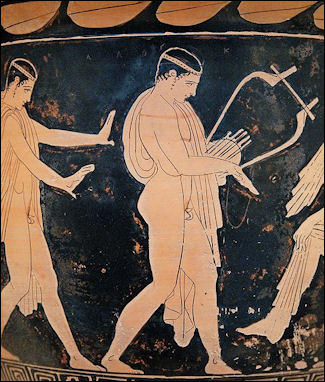
lyricist at a symposia Greek poetry and music included epic stories, drinking songs, religious and processional hymns, funeral dirges, wedding songs, love poems, drama dialogues, and odes to the Gods and heros. Even political speeches had poetic elements. Poetry and verse were considered far superior to prose. The Greeks didn’t have a word for prose until decades after Herodotus developed it as a separate style and then it was referred to simply as “psilos logos” (“naked language”) and “pedzos logos” (“walking language”) as opposed to the “dancing or even airborne language of poetry.” [Source: Daniel Mendelsohn, The New Yorker]
Vowels in the ancient Greek language had both pitch-accent and quantity (time value) unlike the stressed syllables of modern Greek. Thus the syllables of a line of poetry created prosodic rhythm with the long vowels receiving twice the time value as short vowels.
The Greeks were using iambic meter by the 7th century B.C. It was often associated with great orators such as Solon and Archilochus. A little bit later free, more expressive “ lyric” poetry was introduced. The Greeks called it “ medic” poetry. We use the word lyrical because poets who recited it were often accompanied by a lyre.
Sometimes music and poetry contests were staged in conjunction with Olympic-style athletic competitions. Strabo wrote in “Geographia” (c. A.D. 20): “There was anciently a contest held at Delphi, of players on the cithara, who executed a paean in honor of the god. It was instituted by the Delphians. But after the Crisaean war the amphictyons, in the time of Eurylochus, established contests for horses and gymnastic sports, in which the victor was crowned. These were called Pythian games, in addition to the musical contests.” [Source: Fred Morrow Fling, ed., “A Source Book of Greek History,” Heath, 1907, pp. 47-53]
See Homer
Websites on Ancient Greece: Internet Ancient History Sourcebook: Greece sourcebooks.fordham.edu ; Hellenistic World sourcebooks.fordham.edu ; Lives and Social Culture of Ancient Greece, Maryville University online.maryville.edu ; BBC Ancient Greeks bbc.co.uk/history/; Perseus Project - Tufts University; perseus.tufts.edu ; ; Gutenberg.org gutenberg.org; British Museum ancientgreece.co.uk; Illustrated Greek History, Dr. Janice Siegel, Hampden–Sydney College hsc.edu/drjclassics ; Cambridge Classics External Gateway to Humanities Resources web.archive.org/web; Ancient Greek Sites on the Web from Medea showgate.com/medea ; Greek History Course from Reed web.archive.org; Classics FAQ MIT classics.mit.edu
RECOMMENDED BOOKS:
“Greek Lyric Poetry” (Oxford World's Classics) by M. L. West (2008) Amazon.com;
“Poems from Greek Antiquity” (Everyman's Library Pocket Poets Series)
by Paul Quarrie (2020) Amazon.com;
“Epigrams from the Greek Anthology” (Oxford World's Classics) by Gideon Nisbet (2020) Amazon.com;
“Yale Classics - Ancient Greek Literature: Mythology, History, Philosophy, Poetry, Theater (Including Biographies of Authors and Critical Study of Each Work)
by Homer, Hesiod, et al. (2021) Amazon.com;
“Theogony: Works and Days” by Hesiod (Oxford World's Classics) Amazon.com;
“The Iliad And The Odyssey of Homer” by Homer Amazon.com;
“Homer: Poet of the Iliad” by Mark W. Edwards (John Hopkins University Press, 1990) Amazon.com;
“If Not, Winter: Fragments of Sappho” by Sappho, translated by Anne Carson Amazon.com;
“Stung with Love: Poems and Fragments” (Penguin Classics) by Sappho Amazon.com;
“Poetics” (Penguin Classics) by Aristotle Amazon.com;
“Victory Odes” by Pindar Amazon.com;
Aristotle on the Origin of Poetry

Aristotle
Aristotle (384-323 B.C.) wrote in “The Poetics”: ““Poetry in general seems to have sprung from two causes, each of them lying deep in our nature. First, the instinct of imitation is implanted in man from childhood, one difference between him and other animals being that he is the most imitative of living creatures, and through imitation learns his earliest lessons; and no less universal is the pleasure felt in things imitated. We have evidence of this in the facts of experience. Objects which in themselves we view with pain, we delight to contemplate when reproduced with minute fidelity: such as the forms of the most ignoble animals and of dead bodies. The cause of this again is, that to learn gives the liveliest pleasure, not only to philosophers but to men in general; whose capacity, however, of learning is more limited. Thus the reason why men enjoy seeing a likeness is, that in contemplating it they find themselves learning or inferring, and saying perhaps, 'Ah, that is he.' For if you happen not to have seen the original, the pleasure will be due not to the imitation as such, but to the execution, the coloring, or some such other cause.
“Imitation, then, is one instinct of our nature. Next, there is the instinct for 'harmony' and rhythm, meters being manifestly sections of rhythm. Persons, therefore, starting with this natural gift developed by degrees their special aptitudes, till their rude improvisations gave birth to Poetry.
“Poetry now diverged in two directions, according to the individual character of the writers. The graver spirits imitated noble actions, and the actions of good men. The more trivial sort imitated the actions of meaner persons, at first composing satires, as the former did hymns to the gods and the praises of famous men. A poem of the satirical kind cannot indeed be put down to any author earlier than Homer; though many such writers probably there were. But from Homer onward, instances can be cited- his own Margites, for example, and other similar compositions. The appropriate meter was also here introduced; hence the measure is still called the iambic or lampooning measure, being that in which people lampooned one another. Thus the older poets were distinguished as writers of heroic or of lampooning verse.
“As, in the serious style, Homer is pre-eminent among poets, for he alone combined dramatic form with excellence of imitation so he too first laid down the main lines of comedy, by dramatizing the ludicrous instead of writing personal satire. His Margites bears the same relation to comedy that the Iliad and Odyssey do to tragedy. But when Tragedy and Comedy came to light, the two classes of poets still followed their natural bent: the lampooners became writers of Comedy, and the Epic poets were succeeded by Tragedians, since the drama was a larger and higher form of art.”
Ancient Greek Poetry Competitions
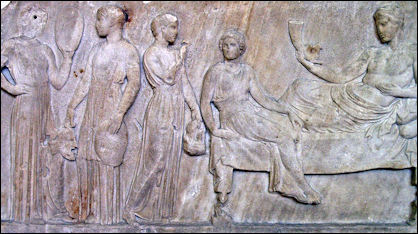
Poetry competition A large annual dramatic and lyrical festival and competition honoring Dionysus was held in the city Dionysia in Athens. It began with a religious procession, culminating in songs, choral dances and sacrifices. The main events featured choral songs called dithyrambs. Dithyrambs were performed by a "circular chorus" of 50 men and boys who sang and danced around an altar in the orchestra area of a theater.
Tribal choruses competed against one another in festivals sponsored by wealthy citizens. The first prize was a bull and a tripod dedicated to Dionysus, second prize was an amphora of wine, and third prize was a goat. At this point in time music, poetry and drama were essentially the same thing and the subjects of the poem-songs were the Greek myths and episodes from the “ Iliad” and “ Odyssey. Fertility festivals started dying out around this time because the harvests and rains they promised to deliver failed to arrive. [Source: "The Creators" by Daniel Boorstin,μ]
Each of the ten Athenian tribes sponsored two dithyramb choruses: one made up of men and other of boys. A wealthy patron paid for the costuming and training for the chorus members and a poet — who composed a poem for the events and choreographed the dances — and a trainer and flutist. It is thought the chorus members circled an altar in the theater and did some dance steps as they did. The chorus also sang and danced during interludes between the dramatic plays.
The contest are said to go back a long time. There is one story of Homer facing off against his younger rival Hesoid, with Hesoid taking first prize because his book “Work and Days” , a long poem about farming, was deemed more “useful” than the “Iliad”.
Poetry, Prose and Rhetoric in Ancient Greece
Poetry preceded prose as a literary form in ancient Greece partly because the tradition of poetic story telling predates the invention of the Greek alphabet. With no written language the rhythm and rhymes of poetry made stories easier to remember and recount orally. The first literary work in prose was a history book by Herodotus (480-425 B.C.) written 800 years after the “Iliad” and “ Odyssey” (which were first written in rhyme) took place.μ
Rhetoric, which essentially means the power of persuasion, was an important skill to the Greeks. Socrates said in 374 B.C. that persuasion was what separated mankind from the animals and brutes.
The great Swiss historian Jacob Burckhardt wrote that oratory skill “became like the press today, the instrument of very little good and three-quarters of everything bad.” It “colored and enfeebled both poetry and history; even the philosophers were partly, in real life, really rhetoricians.”
Rhetoric and Politics, See Government and Democracy
Mnemonics and Memory
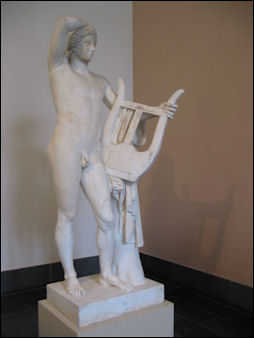
Apollo with a kithara Two of the greatest singer-poets in ancient Greece were Simonides of Ceos, the "inventor of memorization" and reputedly the first poet to make money at writing eulogies, and Avion, who, according to legend, once charmed a dolphin with his lyre playing into carrying him all the way from Sicily to Greece. [Source: "The Creators" by Daniel Boorstin,μ]
The father of mnemonics was Simonides of Ceos who was also reputed to be the first full-time professional poet. Once he was hired by nobleman to create a song in his honor. When Simonides sang a poem that was divided into two parts — one about the nobleman and the other about the Celestial twins Castor an Pollux — the nobleman said he was only going pay half the sum agreed on before. After this a message was brought to Simonides that two young men were waiting for him outside.
The moment he went outside to see who it was the roof of the nobleman's palace collapsed killing almost everyone inside. The callers of course were Castor and Pollux. Later the singer was called into the collapsed palace. The bodies were so mangled they could not be identified. Simonides with his phenomenal memory was able to identify everyone not only because he remembered who everyone was but he could also remember where they had all been sitting. [Source: "The Discoverers" by Daniel Boorstin,∞]
Describing Simonides method Cicero said: "persons desiring to train this faculty must select places and form mental images of the things they wish to remember and store those images in the places, so that the order of the places will preserve the order of the things, and the images of the things will denote the things themselves., and we shall employ the places and images respectively as a wax writing-tablet and the letters written on it.∞
Orpheus and Early Greek Poets
In a review of Michael Schmidt’s ' “The First Poets”,''Camille Paglia wrote in the New York Times, “the evolution from aristocratic rule to democracy in Greece was accompanied by the emergence of a strongly individualistic lyric poetry. While the Hebrew Bible, the other major source of Western literature, expresses a God-centered view of the universe, Greek literature gradually freed itself from the sacred to focus on the uniquely human voice.Schmidt is the editor of PN Review, the founder and director of Carcanet Press and the director of the Writing School at Manchester Metropolitan University in England. He wrote''Lives of the Poets'' (1998), a widely praised 900-page book on English poetry. [Source: Camille Paglia, New York Times, August 28, 2005]
''The First Poets'' covers about a half-millennium of writing up to the third century B.C. Its chronological organization is ideally suited for those seeking an introduction to Greek poetry. Drawing on translators from John Dryden to Guy Davenport, Schmidt deftly explains the problems in translating ''vowel-rich'' ancient Greek into English, which cannot capture Greek's falling rhythms and vocal pitch.
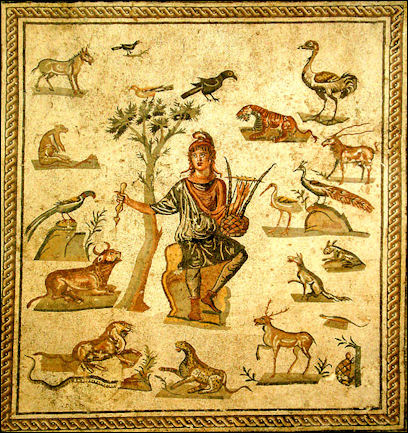
Orpheus The book's profiles begin with Orpheus, the legendary father of poetry and music, whom Schmidt boldly treats as a real person: ''I take Orpheus to have been an actual man with an actual harp in his hand.'' After his wife, Eurydice, was lost in Hades, Orpheus turned to boy-love and was reputedly the first to practice it in his native Thrace. His death was gruesome: he was torn to bits by bacchants, and his severed head floated to the island of Lesbos, which was thereby impregnated with poetic genius.
In his chapter on Hesiod, whose ''Works and Days'' and ''Theogony'' rivaled Homer's epics for near-biblical status in Greek culture, Schmidt gives glimmers of the more reader-friendly book that might have been — an alluring, dreamlike travelogue of the Greek sites where ancient poets lived and created. ''Even today it is no easy matter, getting to where Hesiod's farm used to be,'' he says. Hiking through a parched landscape up Mount Helicon, he sees ''old olive trees clenched among the rock'' and is surprised by ''tiny gusts of exquisite scent'' from the ''wild, almost leafless cyclamen, pale dots of purple.''
With Archilochus, Schmidt hits his stride. ''The only Greek soldier-poet we have,'' Archilochus was born on wind-swept Paros, famed for its translucent marble. As a young man, he was leading a cow to market when the Muses appeared, stole the cow, and left a lyre in its place. Archilochus became a brazen sensualist, caustically irreverent. Schmidt calls him a ''cad,'' a cruel exploiter of women and ''an early defining figure of patriarchy''; his imagery has ''a reptilian eroticism.''
Alcman, who labored for Sparta, provides an eloquent contrast to cynical Archilochus. The ''I'' of Alcman's ''civic'' choral poetry was collective. Schmidt compares Alcman's work to masques like Milton's ''Comus,'' where poetry and music are interwoven. Alcman's poems were ''sung not in the intimacy of the symposium,'' a male dinner party, he writes, ''but in the open, public air.'' Schmidt also laments Sparta's cultural decline. Famous in the seventh century B.C. for its ''music, pottery and poetry,'' it became an imperial power so besotted by militarism that ''three centuries later, the adjective 'Spartan' had become synonymous with 'Philistine.' ''
Next we meet Mimnermus, whom Schmidt calls ''an elegist of pleasure,'' and the misogynous Semonides, who sees woman as sow, vixen and bitch. Then come the great poets of Lesbos, Alcaeus and Sappho, both aristocrats born during the politically unstable early seventh century. Schmidt calls Alcaeus ''a brilliant poet of wine'' and ''debauchery'' but also ''a survival poet, enduring exile and hardships.'' Ancient writers assumed he ''preferred the company of his own sex.''
Book: “The First Poets, Lives of the Ancient Greek Poets” by Michael Schmidt. (Alfred A. Knopf, 2008)
Hesiod and Theogony

Hesiod
The story of creation and other stories comes from “Theogeny” by the Greek poet Hesiod who claims the Muses told him the story while he was tending sheep. The poet Hesiod lived in the same timeframe as Homer, perhaps around 700 B.C. Most scholars agree that he was born in Boeotia and Hesiod himself in one of his major poems - Works and Days - characterizes his homeland as “a cursed place, cruel in winter, hard in summer, never pleasant”. (According to legend he became involved in a bitter land dispute with his brother which, if true, might have coloured his perspective on the matter.) [Source: Canadian Museum of History |]
Hesiod’s birthplace was at the foot of Mount Helicon and tradition has it that the nine muses lived on the mountain. Hesiod credits them with inspiring his words, of breathing into him “a divine voice to celebrate things that shall be and things that were aforetime.” (Theogeny, lines 31-32) |
“Hesiod is remembered for two poems in particular: “Works and Days” and “Theogeny.” The former is an 800 verse poem that extols the virtue of honest labour, a sentiment echoed in later Christian writing that “by the sweat of thy brow thou shalt earn thy bread”. The latter work tells the story of the origins of the world and of the Greek pantheon. Hesiod is credited with a number of other poems but of these only fragments have survived. He is considered to be the first Greek didactic poet.” |
Hesiod Theogony on Women
Hesiod was a near contemporary of Homer and source of some of earliest descriptions of Zeus and the ancient Greek gods and creation story. In Theogony, (c. 700 B.C.), he wrote:
“Pernicious is the race; the woman tribe
“Dwells upon earth, a mighty bane to men;
No mates for wasting want but luxury;
And as within the close-roofed hive, the drones,
Helpers of sloth, are pampered by the bees;
These all the day, till sinks the ruddy sun,
Haste on the wing, 'their murmuring labors ply,'
And still cement the white and waxen comb;
Those lurk within the covered hive, and reap
With glutted maw the fruits of others' toil;
Such evil did the Thunderer send to man

Hesiod and a muse
In woman's form, and so he gave the sex,
Ill helpmates of intolerable toils.
Yet more of ill instead of good he gave:
The man who shunning wedlock thinks to shun
The vexing cares that haunt the woman-state,
And lonely waxes old, shall feel the want
Of one to foster his declining years;
Though not his life be needy, yet his death
Shall scatter his possessions to strange heirs,
And aliens from his blood. Or if his lot
Be marriage and his spouse of modest fame
Congenial to his heart, e'en then shall ill
Forever struggle with the partial good,
And cling to his condition. But the man
Who gains the woman of injurious kind
Lives bearing in his secret soul and heart
Inevitable sorrow: ills so deep
As all the balms of medicine cannot cure.
[Source: Mitchell Carroll, Greek Women, (Philadelphia: Rittenhouse Press, 1908), pp. 96-103, 166-175, 210-212, 224, 250, 256-260, Internet Ancient History Sourcebook: Greece, Fordham University]
“Take to your house a woman for your bride
When in the ripeness of your manhood's pride;
Thrice ten your sum of years, the nuptial prime;
Nor fall far short nor far exceed the time.
Four years the ripening virgin shall consume,
And wed the fifth of her expanding bloom.
A virgin choose: and mould her manners chaste;
Chief be some neighboring maid by you embraced;
Look circumspect and long; lest you be found
The merry mock of all the dwellers round.
No better lot has Providence assigned
Than a fair woman with a virtuous mind;
Nor can a worse befall than when your fate
Allots a worthless, feast-contriving mate.
She with no torch of mere material flame
Shall burn to tinder your care-wasted frame;
Shall send a fire your vigorous bones within
And age unripe in bloom of years begin.’
Sappho
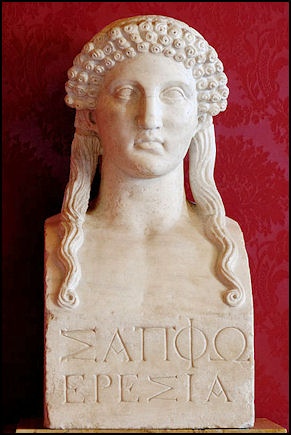
Bust of Sappho at
the Musei Capitolini Sappho wrote sensuously about love between females. The word "lesbian" comes from her home island of Lesbos. Born in 610 B.C. in Lesbos, off of Asia Minor, she was probably from a noble family and her father was probably a wine merchant. Little is known about her because she didn't write much about herself and few others did.
In Sappho's time, Lesbos was inhabited by the Aeolians, a people known for free thinking and liberal sexual customs. Women had more freedom than they did in other places in the Greek world and Sappho is believed to have received a quality education and moved in intellectual circles.
Sappho formed a society for women in which women were taught arts such as music, poetry and chorus singing for marriage ceremonies. Although the relationship between Sappho and the women in her society is unclear she wrote about love and jealousy she felt for them. In spite of this, she had a child named Kleis and may have been married.
In his book “The First Poets”, Michael Schmidt speculates on where she was born and raised on Lesbos: was it in the western village of Eressus in rough, barren country, or in the cosmopolitan eastern seaport of Mytilene? He subtly evokes her poetic style: ''Sappho's art is to dovetail, smooth and rub down, to avoid the over-emphatic.'' And he aptly compares the relationship between voice and musical accompaniment in Sappho's performance of her poems to the recitative in opera. [Source: Camille Paglia, New York Times, August 28, 2005]
Over the centuries passionate arguments over Sappho's character, public life and sexual orientation have sprung up. Even though there is no direct reference to homosexual or heterosexual sex religious leaders — including Pope Gregory VIII, who called her a "lewd nymphomaniac” in 1073 — ordered her books burned.
Sappho's Poetry
Sappho wrote 500 poems, with 12,000 lines, of which 700 lines survive in fragments. Most of her poems are oriented towards women. Even so she also wrote about love of men, celibacy and love itself. Many works are believed to have been lost because they were never copied by medieval monks. Most of the 700 lines come to use via strips of papyrus taken from ancient mummies.
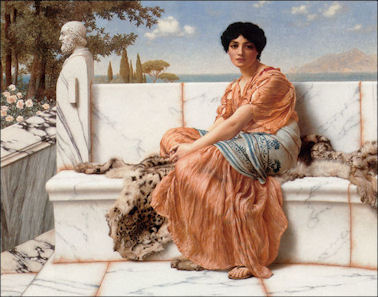
Godward In the Days of Sappho 1904 Some regard Sappho as the greatest poet of antiquity. ''He Seems to Me a God'' and ''Ode to Aphrodite'' are regarded as her two brilliantly original major poems. Describing her jealousy while watching a woman she loved talk to a man, Sappho wrote:
Like the very gods in my sight is he who
sits where he can look in your eyes, who listens
close to you, to hear the soft voice, its sweetness
murmur in love and
laughter, all for him. But it breaks my spirit;
underneath my breast all the heart is shaken”
In a poem dedicated to Aphrodite, “scheming daughter of Zeus,” she wrote:
” For though she flee, soon she’ll be chasing;
Though she refuses gifts, she’ll be giving
Though she loves not, she’ll love despite herself” .
Later Ancient Greek Poets
Paglia wrote in the New York Times, “The lawgiver Solon was the first poet of Athens. His was ''a language of distilled moral truth'' that had what Schmidt calls ''a humorless pithiness.'' Solon's maxims, ''Moderation in all things'' and ''Know thyself,'' were carved on Apollo's temple at Delphi. There were two poets named Anacreon. The ''false'' one inspired the carpe diem (''seize the day'') tradition of ''creature pleasures'' of sex and appetite that would so enchant European literature. The real Anacreon was ''drawn to boys'' and died from inhaling a grape pip. He was honored in a robust nude statue on the Athenian Acropolis.
"The poet Hipponax, Schmidt writes, shows ''the human body at its most gross''; he is ''obsessed with food, sex, excretion'' and ''a cruising lust.'' His poetry, with its ''smells'' and ''obscene diction,'' has ''the repulsive fascination of toilet-wall graffiti.'' Hipponax influenced Aristophanes' farcical comedies and possibly Petronius' decadent ''Satyricon.'' Simonides, a shrewd operator, was the first poet to get rich from selling his work. Corinna's narrative poetry was so admired that she was said to have been Pindar's teacher and rival (though she lived long afterward).
"Pindar's ornate, visionary odes are untranslatable. Commissioned to praise athletic victors or memorialize gifts, they are, Schimdt says, ''the extremity of art,'' moving ''towards timelessness or abstraction.'' He calls them ''a texture of cross-referencing'' and ''an almost continuous string of metaphors.'' The odes of Pindar's rival, Bacchylides, were lost until a smashed papyrus scroll of his work was discovered in Egypt in the 1890's and reassembled at the British Museum.
"After Pindar, Schmidt writes, lyric poetry lost vitality, and ''verse thrived primarily in the drama.'' In the new Hellenistic world inaugurated by the conquests of Alexander the Great, ''cultural authority'' shifted from Athens to Alexandria in Egypt, where poetry now ''lived in libraries'': ''What had been language responding to nature, history, the social world, began to become language responding to prior language.'' The poet Callimachus, for example, was a librarian, ''the father of bibliography.'' His cataloging lists, or canones, became our ''tyrannical canonical texts.''
Schmidt paints a vivid portrait of bustling Alexandria with its ''racial mix'' and ''mess of languages and dialects.'' There Theocritus invented the pastoral idyll, a sentimental fantasy of happy, singing shepherds that would remain chic until the era of Marie Antoinette. Themes of boy-love and ''open-air buggery'' are also part of Theocritus' legacy. For Schmidt, Theocritus was emblematic of radical changes in Greek literature. His poetry was no longer sung for a live audience. Now written down, it addressed ''a creature who hardly existed in Homer's day, the reader.''
Pindar

Pindar
Considered to be ancient Greece’s greatest lyric poet, Pindar was born in Thebes in 522 B.C. He produced a considerable body of work most of which has not survived but which are known in part from quotations by other authors. His victory odes (epinikia) which were composed to celebrate triumphs in various athletic festivals, have survived. These 45 victory odes linked athletic achievement, aristocratic ancestry and a rich mythology of gods and heroes. [Source: Canadian Museum of History |]
Pindar left us lines like “Words have a longer life than deeds” and “Sweet is war to those who know it not.” “He came from an aristocratic family and his writings were greatly influenced by his upper class upbringing. Since most of the clients for which he wrote victory odes came from a similar background, his poetry associates athletic achievement with elite status. His writings also had strong religious overtones stressing the victor’s linkage not only with noble origins but also with immortal entities. He clearly believed that “power is born in the blood”, that the nobility enjoys some form of kinship with the gods and that long after the victors are dead “poems and legends (will) convey their noble deeds”. In reading Pindar the first reaction is to think that this poet belongs to the Age of Aristocracy. Instead, he flourished during the era of Pericles when many Greeks were being swept up in the groundswell towards democracy. |
“Pindar spent most of his life in Thebes. When Alexander, the Great razed Thebes for defying him, he instructed his soldiers to spare the family home of the long dead poet. That was probably partially in recognition of poetry that Pindar had written praising Alexander I of Macedon but also in recognition of the high esteem in which Pindar was held by all Greeks.”
Pindar Poems
“Euripides' Bacchae.” is dedicated to the Athenians and written to be sung in spring during a wild Dionysian festival. It depicts the divine energy of the revitalized world:
When the chamber of the scarlet-clothed Hours is opened
And the nectareous flowers usher in the fragrant spring,
Then are scattered, then, on the immortal ground
The lovely petals of violets; roses are wound in our hair;
Loudly echo the voices of songs to the flutes,
And choirs step in procession to dark-ribboned Semele
[Source: Wikipedia +]

Pindar hailing Olympic champions
Pindar is particularly famous for his Victory Odes. One of them goes:
Creatures of a day! What is anyone?
What is anyone not? A dream of a shadow
Is our mortal being. But when there comes to men
A gleam of splendour given of heaven,
Then rests on them a light of glory
And blessed are their days. +
Another Victory Ode goes:
If ever a man strives
With all his soul's endeavour, sparing himself
Neither expense nor labour to attain
True excellence, then must we give to those
Who have achieved the goal, a proud tribute
Of lordly praise, and shun
All thoughts of envious jealousy.
To a poet's mind the gift is slight, to speak
A kind word for unnumbered toils, and build
For all to share a monument of beauty.
A stanza from Pythian 2, composed in honour of Hieron reads:
God achieves all his purpose and fulfills his every hope,
God who can overtake the winged eagle, or upon the sea
outstrip the dolphin;
and he bends the arrogant heart of many a man,
But gives to others eternal glory that will never fade. Now for me
Is it needful that I shun the fierce and biting tooth of slanderous words.
For from old have I seen sharp-tongued Archilochus in want and struggling,
Grown fat on the harsh words of hate.
The best that fate can bring is wealth
joined with the happy gift of wisdom.
Sophists
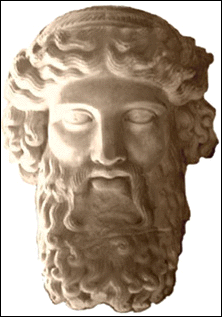
Gorgias, one of the Sophists The Sophists were a group of anti-philosophers. Protagoras (480?-411 B.C.), their founder, believed that the human mind was incapable of fathoming the truth and said that all view points could be argued and people were better off spending their time doing civic duties and helping others. His famous motto was: “Man is the measure of all things.”
Rising to prominence in the 5th century B.C., Sophists were traveling teachers who taught mainly in sports gymnasiums. They opposed philosophical speculation. Instead they taught rhetoric in Dale Carnegie-style positive thinking and getting-ahead-in-life classes. These practical philosophers believed thought and action were intrinsically linked and persuasion was the most effective means of getting what one wanted. The Sophists gave us the word sophism, meaning a clever but specious.
The Sophists had a special speech-making school for generals and statesman. Protagoras taught his students many useful tips including never let "vowels fall in adjacent positions, for this would create a halting effect, nor is it right to end one word and begin the next with same syllable." The leader's most famous speech, “ Panegyric,” took nearly 15 years to compose. [Source: "The Creators" by Daniel Boorstin,μ]
Lost Classics
The Greek poetry that remains today is in a tragically fragmentary state. Camille Paglia wrote in the New York Times, “Only a fraction has survived, much of it by chance — perhaps because it was quoted in an ancient letter or essay. Because of the fragility of papyrus and parchment, Greek literature was decaying by the Roman era. Schmidt stresses what we owe to the Egyptian desert, where papyrus discoveries are still being made in mummy wrappings and trash heaps. Ancient Greek poems today are often merely tentative scholarly reconstructions.
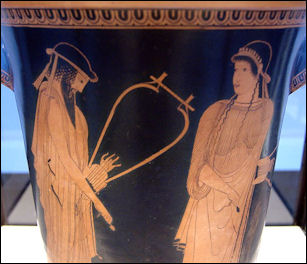
Sappho on a Greek vase John Seabrook wrote in The New Yorker: “One could dare hope for one or two of the lost histories of Livy, of whose hundred and forty-two books on the history of Rome only thirty-five survive. Or perhaps one of the nine volumes of verse written by Sappho, the Greek poet; only one complete poem remains. By some estimates, ninety-nine per cent of ancient Greek literature has been lost, and Latin has not fared much better. [Source: John Seabrook, The New Yorker , November 16, 2015 \=/]
“Among those works we know are missing are Aristotle’s second volume of the Poetics, which was on comedy; Gorgias’ philosophical work “On Non-Existence”; the four missing books of the Roman historian Tacitus’ Annals, covering Caligula’s reign and the beginning of Claudius’; Ovid’s version of “Medea”; and Suetonius on the Greek athletic games. (His “Lives of Famous Whores” also, sadly, has not survived.) Greek tragedy has been decimated. According to the Suda, the tenth-century Byzantine encyclopedia of classical culture, Euripides wrote as many as ninety-two plays; eighteen survive. \=/
“We have seven each from Aeschylus and Sophocles, who wrote about ninety and a hundred and twenty, respectively. “And that’s just the big three of tragedy,” the writer and classics professor Daniel Mendelsohn told me. “Of the thousand that were likely written and performed during the hundred-year heyday of tragedy, we have only thirty-three extant plays—that’s about a three-per-cent survival rate.” \=/
Image Sources: Wikimedia Commons, The Louvre, The British Museum
Text Sources: Internet Ancient History Sourcebook: Greece sourcebooks.fordham.edu ; Internet Ancient History Sourcebook: Hellenistic World sourcebooks.fordham.edu ; BBC Ancient Greeks bbc.co.uk/history/; Canadian Museum of History, Perseus Project - Tufts University; perseus.tufts.edu ; MIT Classics Online classics.mit.edu ; Gutenberg.org, Metropolitan Museum of Art, National Geographic, Smithsonian magazine, New York Times, Washington Post, Live Science, Discover magazine, Natural History magazine, Archaeology magazine, The New Yorker, Encyclopædia Britannica, "The Discoverers" and "The Creators" by Daniel Boorstin. "Greek and Roman Life" by Ian Jenkins from the British Museum, Wikipedia, Reuters, Associated Press, The Guardian, AFP and various books and other publications.
Last updated September 2024
